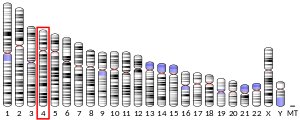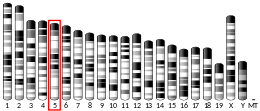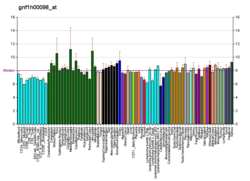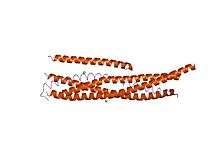CPLX1
Complexin-1 is a protein that in humans is encoded by the CPLX1 gene.[5][6]
Function
Proteins encoded by the complexin/synaphin gene family are cytosolic proteins that function in synaptic vesicle exocytosis. These proteins bind syntaxin, part of the SNAP receptor. The protein product of this gene binds to the SNAP receptor complex and disrupts it, allowing transmitter release.[6]
Interactions
CPLX1 has been shown to interact with SNAP-25[7][8] and STX1A.[9][7][8]
gollark: It's osmarks.tkcraft.
gollark: No.
gollark: How about THIS random picture?
gollark: WHY DO YOU KEEP SHOWING US THIS
gollark: I have a HP ML110 G7 because cheapness.
References
- GRCh38: Ensembl release 89: ENSG00000168993 - Ensembl, May 2017
- GRCm38: Ensembl release 89: ENSMUSG00000033615 - Ensembl, May 2017
- "Human PubMed Reference:". National Center for Biotechnology Information, U.S. National Library of Medicine.
- "Mouse PubMed Reference:". National Center for Biotechnology Information, U.S. National Library of Medicine.
- McMahon HT, Missler M, Li C, Südhof TC (Oct 1995). "Complexins: cytosolic proteins that regulate SNAP receptor function". Cell. 83 (1): 111–9. doi:10.1016/0092-8674(95)90239-2. PMID 7553862.
- "Entrez Gene: CPLX1 complexin 1".
- Chen X, Tomchick DR, Kovrigin E, Araç D, Machius M, Südhof TC, Rizo J (Jan 2002). "Three-dimensional structure of the complexin/SNARE complex". Neuron. 33 (3): 397–409. doi:10.1016/S0896-6273(02)00583-4. PMID 11832227.
- Hu K, Carroll J, Rickman C, Davletov B (Nov 2002). "Action of complexin on SNARE complex". The Journal of Biological Chemistry. 277 (44): 41652–6. doi:10.1074/jbc.M205044200. PMID 12200427.
- Dulubova I, Sugita S, Hill S, Hosaka M, Fernandez I, Südhof TC, Rizo J (Aug 1999). "A conformational switch in syntaxin during exocytosis: role of munc18". The EMBO Journal. 18 (16): 4372–82. doi:10.1093/emboj/18.16.4372. PMC 1171512. PMID 10449403.
External links
- Human CPLX1 genome location and CPLX1 gene details page in the UCSC Genome Browser.
Further reading
- Abe T (Jun 2002). "[The mechanism of neurotransmitter release: role of synaphin/complexin in synaptic vesicle exocytosis]". Tanpakushitsu Kakusan Koso. Protein, Nucleic Acid, Enzyme. 47 (7): 794–800. PMID 12058476.
- Ishizuka T, Saisu H, Odani S, Abe T (Aug 1995). "Synaphin: a protein associated with the docking/fusion complex in presynaptic terminals". Biochemical and Biophysical Research Communications. 213 (3): 1107–14. doi:10.1006/bbrc.1995.2241. PMID 7654227.
- Harrison PJ, Eastwood SL (Nov 1998). "Preferential involvement of excitatory neurons in medial temporal lobe in schizophrenia". Lancet. 352 (9141): 1669–73. doi:10.1016/S0140-6736(98)03341-8. PMID 9853440.
- Ishizuka T, Saisu H, Odani S, Kumanishi T, Abe T (Jan 1999). "Distinct regional distribution in the brain of messenger RNAs for the two isoforms of synaphin associated with the docking/fusion complex". Neuroscience. 88 (1): 295–306. doi:10.1016/S0306-4522(98)00223-1. PMID 10051208.
- Eastwood SL, Cotter D, Harrison PJ (2001). "Cerebellar synaptic protein expression in schizophrenia". Neuroscience. 105 (1): 219–29. doi:10.1016/S0306-4522(01)00141-5. PMID 11483314.
- Chen X, Tomchick DR, Kovrigin E, Araç D, Machius M, Südhof TC, Rizo J (Jan 2002). "Three-dimensional structure of the complexin/SNARE complex". Neuron. 33 (3): 397–409. doi:10.1016/S0896-6273(02)00583-4. PMID 11832227.
- Sawada K, Young CE, Barr AM, Longworth K, Takahashi S, Arango V, Mann JJ, Dwork AJ, Falkai P, Phillips AG, Honer WG (2002). "Altered immunoreactivity of complexin protein in prefrontal cortex in severe mental illness". Molecular Psychiatry. 7 (5): 484–92. doi:10.1038/sj.mp.4000978. PMID 12082566.
- Basso M, Giraudo S, Corpillo D, Bergamasco B, Lopiano L, Fasano M (Dec 2004). "Proteome analysis of human substantia nigra in Parkinson's disease". Proteomics. 4 (12): 3943–52. doi:10.1002/pmic.200400848. hdl:11383/1491905. PMID 15526345.
- Rual JF, Venkatesan K, Hao T, Hirozane-Kishikawa T, Dricot A, Li N, Berriz GF, Gibbons FD, Dreze M, Ayivi-Guedehoussou N, Klitgord N, Simon C, Boxem M, Milstein S, Rosenberg J, Goldberg DS, Zhang LV, Wong SL, Franklin G, Li S, Albala JS, Lim J, Fraughton C, Llamosas E, Cevik S, Bex C, Lamesch P, Sikorski RS, Vandenhaute J, Zoghbi HY, Smolyar A, Bosak S, Sequerra R, Doucette-Stamm L, Cusick ME, Hill DE, Roth FP, Vidal M (Oct 2005). "Towards a proteome-scale map of the human protein-protein interaction network". Nature. 437 (7062): 1173–8. doi:10.1038/nature04209. PMID 16189514.
- Giraudo CG, Eng WS, Melia TJ, Rothman JE (Aug 2006). "A clamping mechanism involved in SNARE-dependent exocytosis". Science. 313 (5787): 676–80. doi:10.1126/science.1129450. PMID 16794037.
This article is issued from Wikipedia. The text is licensed under Creative Commons - Attribution - Sharealike. Additional terms may apply for the media files.






